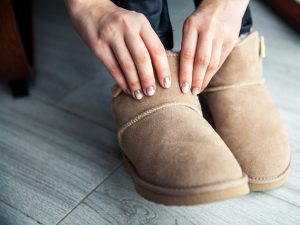 Deckers Outdoor Corp. sued an Australian company, Australian Leather, Ltd. in 2016 asking the court to enjoin Australian Leather from selling their competing boots in the U.S. and alleging infringement of their trademark and patents.
Deckers Outdoor Corp. sued an Australian company, Australian Leather, Ltd. in 2016 asking the court to enjoin Australian Leather from selling their competing boots in the U.S. and alleging infringement of their trademark and patents.
Australian Leather argued that Deckers’ trademark is invalid because the term “Ugg” is generic in the U.S. However, Deckers provided evidence of a nationwide U.S. survey demonstrating that 98% of American respondents viewed “Ugg” as a brand. Thus, the court was not persuaded that “Ugg” is generic in the U.S.
Australian Leather also argued that the term “Ugg” cannot be trademarked in the U.S. under the doctrine of “foreign equivalents.” Under this doctrine, a foreign language term used generically in that foreign country cannot be registered as a trademark in the U.S. Since the term “Ugg” has been ruled to be generic in Australia, Australian Leather alleged it could not be trademarked in the U.S. However, the doctrine of foreign equivalents is generally used to analyze non-English terms and, on that basis, the court found that generic usage of the English term “Ugg” in Australia is not dispositive of generic meaning in the U.S.
After a four-day trial in Illinois federal court, a jury determined that Australian Leather willfully infringed the Ugg trademark registered in the United States to Deckers and awarded Deckers $450K in statutory damages on May 10, 2019.
Other issues heard in a bench trial held at the same time have not yet been decided by the court. One issue to be decided by the court is whether Australian Leather willfully infringed Deckers’ design patents. Another issue is whether Deckers trademark is unenforceable due to unclean hands. Australian Leather alleged fraudulent misuse of the ® symbol by the owners of the trademark prior to Deckers when the mark was not actually registered with the U.S. Patent & Trademark Office.
The parties now await Judge Shah’s judgement on the remaining issues. If the court rules in Deckers’ favor, Australian Leather could be enjoined from selling their competing boots in the U.S. and could be ordered to pay more in damages, penalties, and attorney fees.






